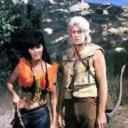Yahoo Answers is shutting down on May 4th, 2021 (Eastern Time) and the Yahoo Answers website is now in read-only mode. There will be no changes to other Yahoo properties or services, or your Yahoo account. You can find more information about the Yahoo Answers shutdown and how to download your data on this help page.
Trending News
The relativity of time?
Here is a story I made up to illustrate my question:
Last year, I went for a trip on my near-light-speed spaceship. On return, the space agency asked me to pay "space taxes" for one year. I answered that, on the clock of my spaceship I had been away only for one week and I don't intend to pay for one year. Then, trying to be smart, I asked them:
"And how do you know I went for a near-light-speed trip and it is not you, and the earth, that moved away from me, since there is no absolute space reference?"
I think I know their answer that would be something like: "Ah but the inertia measuring instrument of your spaceship shows that you accelerated then decelerate, which we didn't!"
But I am not sure how acceleration and deceleration affects the observation of time. Any idea?
Yes but Lorentz factor takes into consideration speed difference, time and speed of light, not acceleration. What puzzles me is that - as far as I know - we can't distinct acceleration from gravitation. I am thinking of the tree that hides the forest.
Yes but Lorentz factor takes into consideration speed difference, time and speed of light, not acceleration. What puzzles me is that - as far as I know - we can't distinct acceleration from gravitation. I am thinking of the tree that hides the forest.
5 Answers
- Lola FLv 78 years agoFavorite Answer
There is more to Relativity than the Lorentz factor. In particular, there is the relativity of simultaneity. A moving reference frame's clocks are not only slow, they are observed to be out of sync. When you leave Earth for, say, Vega, the trip only takes half a week, but the clock on Vega says half a year when you get there. Why? Because when you left, the clock on Vega and the clock on Earth, synchronized in the Earth/Vega frame, were out of sync in your frame, the Vega clock *already* showing nearly half a year. Because in a moving frame (the Earth/Vega frame), clocks behind in the parade read ahead.
Then you turn around and head back to Earth. Now Earth, which used to be ahead in the parade, is suddenly behind. The moment before you turned around, Vega's clock right next to you read half a year and Earth's clock read just a few hours, because it started at zero and ran slow. But after you turn around, you enter a new reference frame in which Vega is ahead in the parade and Earth is behind. Vega's clock still reads half a year, because it's right next to you, but because Earth is behind in the parade now, it must read ahead of Vega's: it now suddenly reads almost a whole year. And thus when you return it reads a year, even though it's been running slow your entire journey, except that one moment when you turned around.
And if you must bring gravitation into it, then you *could* interpret this as one of two ways. Either you fired your rockets in order to accelerate and turn around, or you fired your rockets to remain stationary in a universal gravitational field that suddenly appeared. During that time, Earth was far above you in this gravitational field, and clocks that are high in g-fields run fast, so during that time you had to fire your rockets to remain stationary, Earth's clocks were running very fast.
- HypnoticLv 48 years ago
I think that's the essence of relativity. Relative to each other it is not possible to know which object is moving. But the Earth, on which the space agency's vehicle rental depot resides, travels at a fairly regular speed around the Sun, which presumably travels at a determinable path/speed in the Milky Way. Thus there are numerous frames of reference (stars, planets, etc.) and it should be easy to determine that it was you who travelled for a year of relative-from-Earth time, despite perceiving it to be a week. However, if the universe only consisted of the Earth and the one space ship... maybe some more elaborate means would be needed to figure out how much tax your owe.
"But I am not sure how acceleration and deceleration affects the observation of time. Any idea?"
- 8 years ago
They would have won the argument, of course. According to relativity theory the acceleration/deceleration you experienced is exactly why there is a discrepancy in time. If you had just maintained a near light speed in one direction, both you and the earth would undergo the same amount of time dilation as seen from the other. But since you had to stop and turn around at some point, not the earth, your perception of time has been altered.
- ?Lv 68 years ago
More time passed on Earth than on your ship, therefore you were the one who moved at near-light speed.
Live long and prosper.
- 8 years ago
acceleration has reduced the speed of time in your spaceship, and deceleration has made back the normal time.But your story made me think that YOU DIDN'T MOVED.




